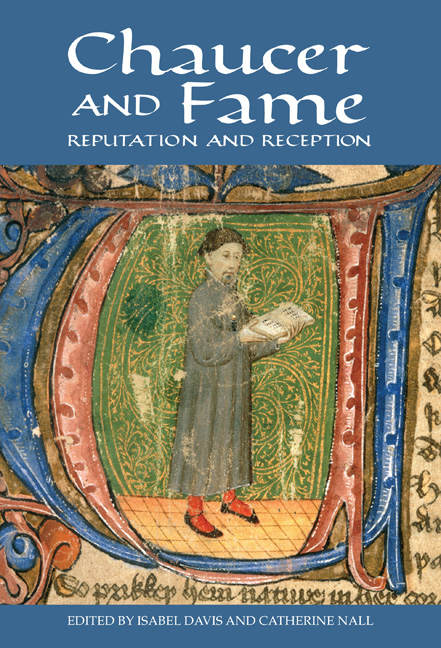Book contents
- Frontmatter
- Contents
- List of Illustrations
- List of Contributors
- Acknowledgements
- Introduction
- 1 Chaucer Joins the Schiera: The House of Fame, Italy and the Determination of Posterity
- 2 ‘I Wolde … han Hadde a Fame’: Dante, Fame and Infamy in Chaucer’s House of Fame
- 3 ‘And kis the Steppes where as thow Seest Pace’: Reconstructing the Spectral Canon in Statius and Chaucer
- 4 ‘I Nolde Sette at al that Noys a Grote’: Repudiating Infamy in Troilus and Criseyde and The House of Fame
- 5 The Early Reception of Chaucer’s The House of Fame
- 6 Fame’s Penitent: Deconstructive Chaucer Among the Lancastrians
- 7 After Deschamps: Chaucer’s French Fame
- 8 ‘Fresch Anamalit Termes’: The Contradictory Celebrity of Chaucer’s Aureation
- 9 Chaucer the Puritan
- 10 Revenant Chaucer: Early Modern Celebrity
- 11 Ancient Chaucer: Temporalities of Fame
- Bibliography
- Index
- Chaucer Studies
4 - ‘I Nolde Sette at al that Noys a Grote’: Repudiating Infamy in Troilus and Criseyde and The House of Fame
Published online by Cambridge University Press: 21 May 2021
- Frontmatter
- Contents
- List of Illustrations
- List of Contributors
- Acknowledgements
- Introduction
- 1 Chaucer Joins the Schiera: The House of Fame, Italy and the Determination of Posterity
- 2 ‘I Wolde … han Hadde a Fame’: Dante, Fame and Infamy in Chaucer’s House of Fame
- 3 ‘And kis the Steppes where as thow Seest Pace’: Reconstructing the Spectral Canon in Statius and Chaucer
- 4 ‘I Nolde Sette at al that Noys a Grote’: Repudiating Infamy in Troilus and Criseyde and The House of Fame
- 5 The Early Reception of Chaucer’s The House of Fame
- 6 Fame’s Penitent: Deconstructive Chaucer Among the Lancastrians
- 7 After Deschamps: Chaucer’s French Fame
- 8 ‘Fresch Anamalit Termes’: The Contradictory Celebrity of Chaucer’s Aureation
- 9 Chaucer the Puritan
- 10 Revenant Chaucer: Early Modern Celebrity
- 11 Ancient Chaucer: Temporalities of Fame
- Bibliography
- Index
- Chaucer Studies
Summary
When Boitani published his book on The House of Fame in 1984, he underlined the conflicted nature of that text – how Chaucer's position concerning ‘the problem of glory and fame’ seemed to oscillate. My objective in this essay is to ponder one facet of that Chaucerian ambivalence concerning fame, as it emerges in Troilus and Criseyde. In a nutshell, what I shall be scrutinizing is a moment in the poem when the heroine is tempted towards the sceptical view that notoriety is not worth worrying about. The moment seems to pass, the explicit reason she gives for scepticism seems to evaporate; and we may wonder whether Chaucer has somehow, interestingly, fudged a key issue here, given that the poem makes both the heroine and the reader rather conscious of posterity heaping notoriety on Criseyde.
Readers hardly need reminding that, in both Boccaccio's and Chaucer's renditions, the heroine is a character acutely anxious to uphold her honour, her ‘name’. And then, as now, one's name, of course, constituted one's fame. For Boccaccio's Criseida the concern for reputation is generally more of a front – or, as Hanning noted, a ‘shield’ – whereas for Chaucer's Criseyde it expresses a more deeply held principle. But the language of the two heroines is often similar. Thus, when the crucial decision has to be taken as to whether Troilo should comply with the edict for his mistress's departure to the Greek camp, or defy it by running off with her into exile (as his instinct tells him is preferable), Criseida dismisses that alternative by imagining what people would say: how her abduction would cause the reputations of both of them to be degraded. He would become ‘biasimato’ (‘blamed’), to the destruction of his ‘fama’ (in Chaucer, his ‘honour’). And her ‘onestate’ (‘respectability’) would be blotted with ‘infamia’ (‘infamy’), never to be restored in a thousand years. In Chaucer, her respectability would be spotted ‘with filthe’, and ‘My name sholde I nevere ayeynward wynne’ (Filostrato, Book 4, 147–51; Troilus and Criseyde, Book 4, lines 1555, 1582). Here is one of the bitterest moments of irony in both texts. Her ‘name’ will be forever in question as a consequence of trying to preserve it, precisely because the supposedly lesser public risk of complying with the exchange order takes her into the arms of Diomede, and so her reputation is blotted in another way.
- Type
- Chapter
- Information
- Chaucer and FameReputation and Reception, pp. 75 - 86Publisher: Boydell & BrewerPrint publication year: 2015
- 1
- Cited by

